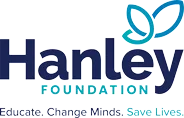(West Palm Beach, FL) – Hanley Foundation, a community leader in substance abuse prevention programming, presented its Alcohol Literacy Challenge (ALC) program to more than 250 John F. Kennedy Middle School students in Riviera Beach as part of the 2017 Red Ribbon Week observances, held Oct. 23-31.
Red Ribbon Week is a global initiative started in 1988 by the National Family Partnership to prevent substance abuse among youth. It’s held each October. Hanley Foundation, established more than 30 years ago by Mary Jane and Jack Hanley, is a charitable 501(c)(3) organization with a mission to give hope to individuals, families and communities affected by substance use disorders. The Foundation provides programming and grant support throughout Florida for advocacy, prevention, education and access to quality addiction treatment. The organization’s prevention programming is available to schools, churches and community groups through grant funding provided by the Florida Department of Children and Families, office of Substance Abuse and Mental Health.
“We know that prevention programming reaching school age children is a successful strategy to keep kids away from alcohol and other drugs,” said Hanley Foundation Prevention Specialist Dora Vazquez, who presented the ALC program to the JFK Middle School students. “Children and teens who begin drinking before age 15 are four times more likely to become alcohol addicted than those who do not drink before age 21, and ALC teaches students both the real, physical effects of consuming alcohol and other substances, as well as the social and emotional effects kids think happen when they drink or use.”
The 90-minute ALC program is designed to alter alcohol expectancies and reduce the quantity and frequency of alcohol use among middle and high school students. Alcohol expectancies are an individual’s beliefs about the anticipated effects of alcohol use, including those that are positive (e.g., increased sociability, reduced tension) and negative (e.g., impairments to mental and behavioral functioning, increased aggressiveness or risk taking). Some of the most desired effects—the positive and prosocial effects – are placebo effects rather than pharmacological ones. ALC aims to correct erroneous beliefs about the effects of alcohol, decreasing positive and increasing negative expectancies. These shifts in expectancies have been shown to predict lower levels of alcohol use. ALC also demonstrates to students the advertising and marketing formula’s alcohol companies use to market to younger users.
For more information about Hanley Foundation, or to request free prevention programming for a school, church or youth group, please visit www.hanleyfoundation.org or call 561-268-2355.


